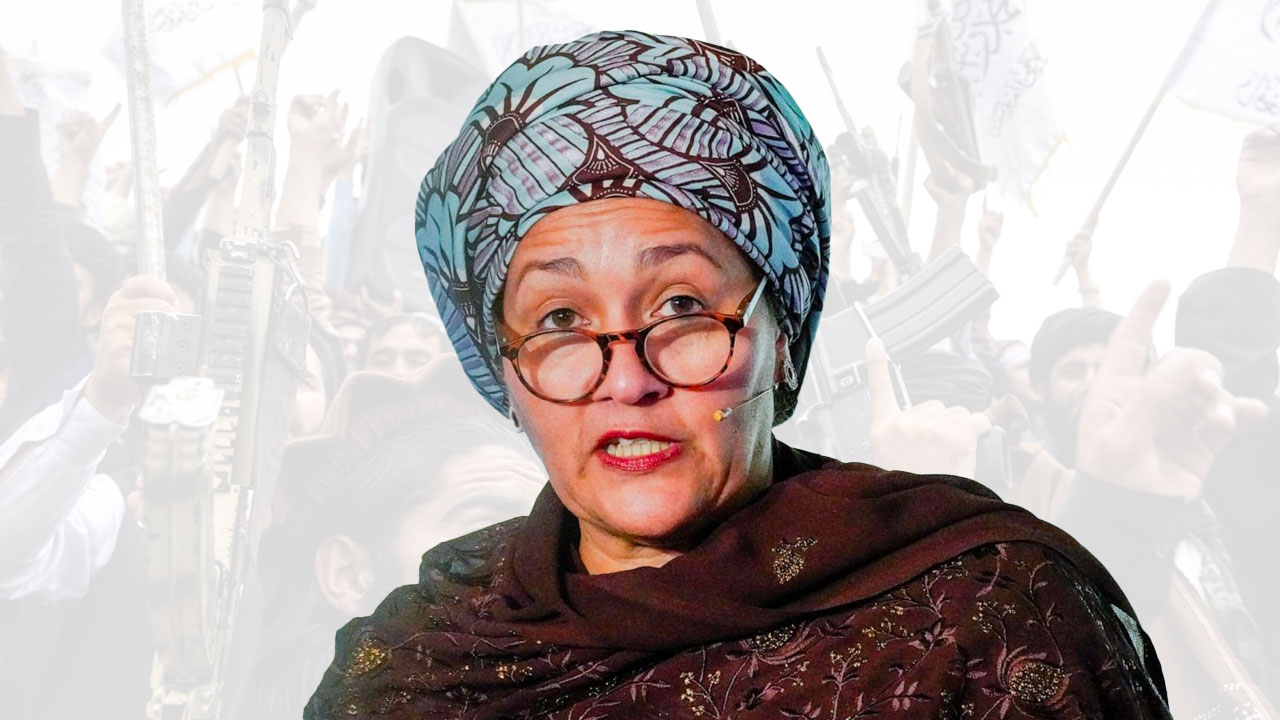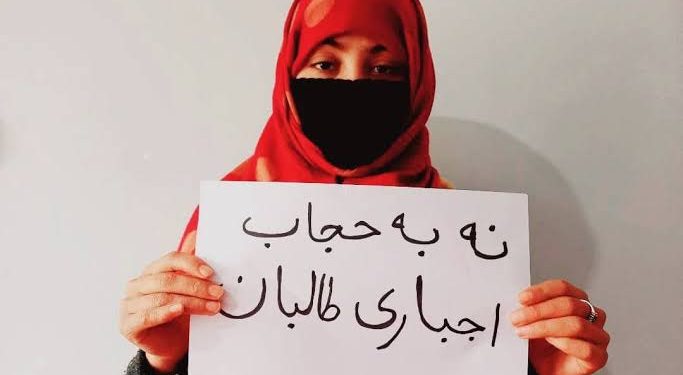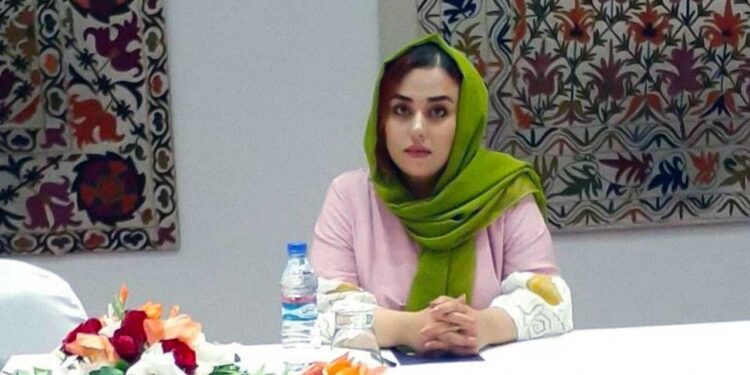UN Deputy Secretary-General Amina Mohammed’s recent remarks on the United Nations convening a meeting to address the recognition of the Taliban terrorist group as the legitimate government in Afghanistan have sparked widespread reactions.
As per Mohammad’s remarks during a program at Princeton University, a meeting is scheduled to take place in Qatar in less than two weeks. The meeting is expected to be attended by United Nations Secretary-General Antonio Guterres and representatives from several countries in the region and around the world.
According to the UN Deputy Secretary-General, the upcoming meeting is expected to discuss the possible recognition of the Taliban as the legitimate government of Afghanistan. “We hope that we’ll find those baby steps to put us back on the pathway to recognition [of the Taliban], a principled recognition,” she said. “Is it possible? I don’t know. [But] that discussion has to happen.”
Amina Mohammed believes that recognizing and engaging with the Taliban may help prevent their decisions from worsening, ensuring that they are held accountable for their actions. “We cannot allow that they continue to get worse, which is what happens when you don’t engage,” she added.
Shahrazad Akbar, the former head of Afghanistan’s Independent Human Rights Commission, took to Twitter to respond to the UN Deputy Secretary-General’s remarks on the organization’s meeting to discuss the recognition of the Taliban. “What does ‘discussing recognition of Taliban’ mean?” she asked. “The same Taliban who are implementing a gender apartheid? The group that is denying girls education, women the right to work, & restricting movement & access to healthcare on the basis of gender?”
Civil activist Fariha Easar responded to Amina Mohammed’s remarks by taking to Twitter and posting, “Stop normalizing terrorism by supporting terrorist & gender apartheid regime! We urge the UN to uphold the highest standard of human rights & justice rather than legitimizing and uplifting Taliban and negating human rights.”
Women’s rights activist Masouda Kohestani also responded to Amina Mohammed’s remarks, sending a videotape to Nimrokh. “As a senior UN official, Amina Mohammed’s hasty remarks are a betrayal to the fighting women, the people of Afghanistan, and those who have fought for freedom, democracy, and human rights against the Taliban terrorist group,” she said.
Ali Maisam Nazary, head of foreign relations for the National Resistance Front of Afghanistan (NRF), expressed deep concern regarding the UN Deputy Secretary-General’s remarks about convening a conference to discuss the recognition of the Taliban.
Nazari took to Twitter, stating that “Recognizing a terrorist and criminal organization as Afghanistan’s government is an insult and betrayal to its resilient people.”
He further added that the international community should stand in solidarity with the people of Afghanistan and oppose any effort to recognize a terrorist group.
Journalist and Founder of Rukhshana Media, Zahra Joya, criticized the UN’s decision to hold a meeting to discuss the recognition of the Taliban, calling it a grave mistake. Joya took to Twitter and wrote, “It is highly probable that the UN will recognize the Taliban. But the real question is, what specific mechanism and strategy will they implement to address the issues of the people of Afghanistan?”
The former head of Afghanistan’s national security, Rahmatullah Nabil, expressed concern over the UN Deputy Secretary-General’s remarks, stating that the proposal to recognize the Taliban as the legitimate government of Afghanistan is deeply concerning.
Nabil took to Twitter and wrote, “Recognition of the Taliban as the legitimate government of Afghanistan is a betrayal of Afghan women and minorities who have suffered under their rule.”
President of the Movement for Change Party and former member of the Afghan Parliament, Fawzia Koofi, demanded an explanation from Amina Mohammad regarding the discussion on recognizing the Taliban as the legitimate government of Afghanistan. Koofi expressed her concern on Twitter, stating that this discussion has caused an “enormous level of concern among the population.” She added that there is a fear that “Afghanistan is once again played with as a piece of cake.”
Journalist Nilofar Ayoubi expressed her disappointment in the UN Deputy Secretary-General, Amina Mohammed, for her remarks regarding the recognition of the Taliban as the legitimate government of Afghanistan. “It is so heartbreaking and infuriating to see a Woman is breaking Afghan Women’s trust and calling for the recognition of their oppressors,” she wrote on Twitter.
Civil activist and protesting woman, Razia Barakzai, criticized the UN Deputy Secretary-General, Amina Mohammad, for her remarks regarding the recognition of the Taliban as the legitimate government of Afghanistan. In a videotape posted on her Twitter account, Barakzai called Mohammed’s words a disregard for the will of the Afghan people, stating that “The irresponsible words of the UN Deputy Secretary-General not only ignore the will of the Afghan people but also insult humanity”.
Barakzai expressed disappointment in Amina Mohammed, as a woman and the UN Deputy Secretary-General, for not standing with the women and people of Afghanistan and instead, supporting the Taliban group.
She called on the United Nations and member states to clarify their position on Amina Mohammed’s irresponsible remarks. “We, the people of Afghanistan, must know who is standing in front of us and is supporting the Taliban,” she stated. “We will not, in our struggle ahead, forgive and forget the Taliban and their supporters for their actions.”
In January 2023, Amina Mohammed took a trip to Afghanistan after the Taliban leader issued orders to prohibit women’s education and employment. She visited the cities of Kabul, Kandahar, and Herat, but was unable to secure a meeting with the Taliban leader. Despite Mohammed’s positive assessment of her trip upon her return from Afghanistan, some experts viewed the Taliban’s treatment towards her as disrespectful, as the key Taliban officials refused to meet her.
While accompanying Amina Mohammed during her visit to Kandahar, a group of her bodyguards took a photo with the Taliban flag and shared it on the internet as a show of support for the group. This action drew widespread condemnation and anger from the Afghan people and caused U.N. spokesperson Farhan Haq, to apologize on behalf of the organization.
The UN Deputy Secretary-General’s remarks regarding the recognition of the Taliban come as the administrator of the United Nations Development Programme, Achim Steiner, shared his perspective on the situation in Afghanistan with the Associated Press earlier this week. According to Steiner, the UN is firm in its stance that it will withdraw from Afghanistan if the Taliban refuse to rescind its recent orders that prohibit women from engaging in gainful employment.
The United Nations has issued these two contradictory messages regarding the Taliban group and the state of affairs in Afghanistan at a time when the group persists in tightening its grip on women, civil activists, and the general public. In a message published on Tuesday to mark the occasion of Eid al-Fitr, Mullah Haibatullah Akhundzada, the leader of the Taliban terrorist group, declared that the “traces and signs of occupation” in Afghanistan were disappearing and that a “completely Islamic and Sharia-based system” had been established in the country.
As the United Nations prepares to make a decision between two options – either withdrawing from Afghanistan or recognizing and granting privileges to the Taliban – there are indications that the latter option may be chosen. While details about the upcoming meeting in Qatar are scarce, the choice of the meeting location suggests that the political office of the Taliban in Doha and its supporters within the Qatari government have played a significant role in arranging the meeting.
According to a tweet by Zalmay Khalilzad, U.S. Special Representative for Afghanistan Reconciliation, the meeting mentioned previously is set to take place on May 1, 2023.
Zalmay Khalilzad, who is known for his lobbying for the Taliban and was involved in negotiating the peace agreement between the US and the Taliban in Doha, has recently suggested that the United Nations hold a meeting with the Taliban to establish a roadmap for the future of Afghanistan. However, many Afghans, particularly women, are concerned that any agreement with the Taliban may legitimize their history of terrorism and further entrench their control over the country.






